The little label on the back tells us that this is "Nannuo Qiaomu". The price is low, at $13. If this qiaomu [tall tree / arbor], it's superbly inexpensive. If it isn't qiaomu, it's still inexpensive!
A brief aside on vendor-made cakes, seeing as we have examples from Nadacha, Puerh Shop, and now Yunnan Sourcing this year. I'm of the opinion that vendor-made cakes are a Very Good Thing. Normal "factory" cakes require at least two or three people taking a profit margin from the cake; e.g., a Xiaguan cake will require profit margin sufficient to cover (i) the tea farmer, (ii) the factory itself, (iii) the factory's distributor, and (iv) the final vendor (such as Yunnan Sourcing or Puerh Shop).
When vendors make their own cake, they snip out (iii), and could well reduce the cost of (ii) as well. So, the bottom line price to the customer could be lower. Also, because the vendor has a personal stake in the cake, they are maximally exposed and therefore obliged to make it fairly decent. There's no hiding behind a big label if your own tea turns out to be a failure! Perhaps due to this personal stake, the quality of vendor-made cakes (for the price) often seems to be much better than factory runs.
So, keep at it, I say. If it's cheaper to the vendor, then chances are it's cheaper to the customer, too, and (hopefully) better quality.
A brief aside on vendor-made cakes, seeing as we have examples from Nadacha, Puerh Shop, and now Yunnan Sourcing this year. I'm of the opinion that vendor-made cakes are a Very Good Thing. Normal "factory" cakes require at least two or three people taking a profit margin from the cake; e.g., a Xiaguan cake will require profit margin sufficient to cover (i) the tea farmer, (ii) the factory itself, (iii) the factory's distributor, and (iv) the final vendor (such as Yunnan Sourcing or Puerh Shop).
When vendors make their own cake, they snip out (iii), and could well reduce the cost of (ii) as well. So, the bottom line price to the customer could be lower. Also, because the vendor has a personal stake in the cake, they are maximally exposed and therefore obliged to make it fairly decent. There's no hiding behind a big label if your own tea turns out to be a failure! Perhaps due to this personal stake, the quality of vendor-made cakes (for the price) often seems to be much better than factory runs.
So, keep at it, I say. If it's cheaper to the vendor, then chances are it's cheaper to the customer, too, and (hopefully) better quality.
Looking at the cake, pictured above, we can see that it is a good mixture of whole leaves, with a few tips. Its aroma is straightforward: sweet and solid. It looks like a decent cake.
(The neifei seems to have been removed, and you can see the spot where it once lived in the centre of the above photograph.)
(The neifei seems to have been removed, and you can see the spot where it once lived in the centre of the above photograph.)
It's time to relax. Week-end tea sessions are my favourite - I really only get to sit down at the tea-table on Saturday and Sunday mornings these days, with my week being spent drinking hongcha and shupu in my office. This makes the week-end sessions all the more valuable, and so each one brings with it the feeling of being a real treat.
The soup turns out to be a pleasant yellow - it certainly hasn't been "Xiaguan'd", and it has a dense aroma of low, sweet leather. This is more like it!
Floral, sweet Nannuo flavours fill the cup, and the texture is good and thick. There is a strong tang at the end, which flips over into a potent huigan. A touch of roughness dwells in the throat, making it feel a little raw.
The soup turns out to be a pleasant yellow - it certainly hasn't been "Xiaguan'd", and it has a dense aroma of low, sweet leather. This is more like it!
Floral, sweet Nannuo flavours fill the cup, and the texture is good and thick. There is a strong tang at the end, which flips over into a potent huigan. A touch of roughness dwells in the throat, making it feel a little raw.
As the infusions pass, the tea tends towards a pleasant, but simple, sweetness. In conjunction, the roughness in the throat begins to dominate, and by the tenth infusion it has become particularly abrasive.
"This is quite brutal", notes Lei, as she grabs a random cup in passing.
It leaves a lovely, leathery scent in the nose, along with all that Nannuo floweriness, which I appreciate very much.
"This is quite brutal", notes Lei, as she grabs a random cup in passing.
It leaves a lovely, leathery scent in the nose, along with all that Nannuo floweriness, which I appreciate very much.
It is unfortunate for this cake that I have recently had the 2009 Nannuo Qiaomu from Nadacha. Whereas the latter is elegant, packed with content, and entirely free of abrasive characteristics in the throat, I found the Meiguohao to be quite hard going after the fifth infusion, though very pleasant at the start.
The difference in quality between this 902 and the 904 is stark - the 904 being clean, smooth, and enjoyable. This 902 feels much more "down to earth", and I quietly doubt its claims to being qiaomu. It has a muted, distant cooling sensation on the tongue as if it has some qiaomu leaf in it (indeed, if that correlates with being qiaomu maocha at all), but that it has been diluted.
Buying maocha is a notoriously difficult enterprise, and Nada writes on his blog that even buying the leaves in person is no guarantee of quality, because the farmers dilute their qiaomu with taidicha [plantation] leaves.
That said, the Meiguohao 902 is super-cheap. Perhaps comparing it to the more expensive Nadacha cake, and even the Meiguohao 904, is unfair because of the price difference. In comparison to other teas in its league (e.g., Dayi), it's a great tea for the price. Good value, and decent tea.
The difference in quality between this 902 and the 904 is stark - the 904 being clean, smooth, and enjoyable. This 902 feels much more "down to earth", and I quietly doubt its claims to being qiaomu. It has a muted, distant cooling sensation on the tongue as if it has some qiaomu leaf in it (indeed, if that correlates with being qiaomu maocha at all), but that it has been diluted.
Buying maocha is a notoriously difficult enterprise, and Nada writes on his blog that even buying the leaves in person is no guarantee of quality, because the farmers dilute their qiaomu with taidicha [plantation] leaves.
That said, the Meiguohao 902 is super-cheap. Perhaps comparing it to the more expensive Nadacha cake, and even the Meiguohao 904, is unfair because of the price difference. In comparison to other teas in its league (e.g., Dayi), it's a great tea for the price. Good value, and decent tea.

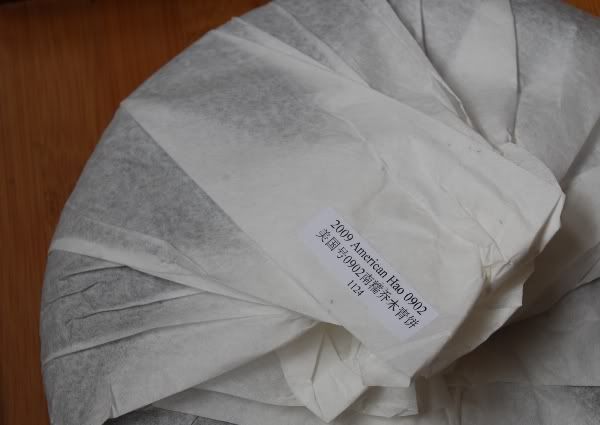
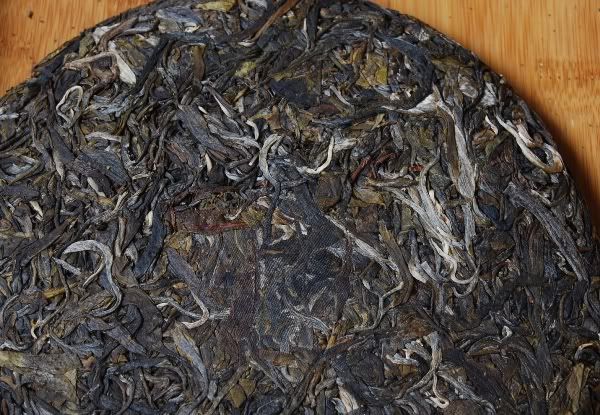
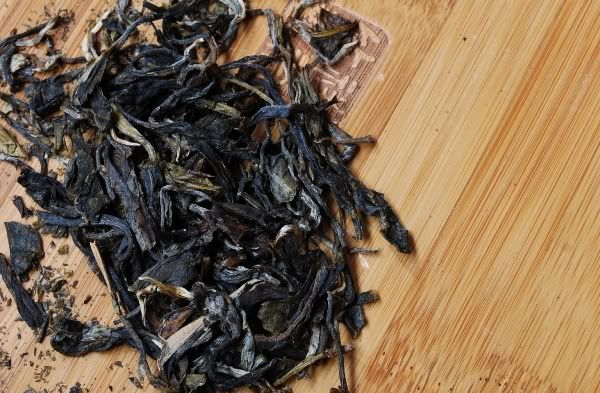
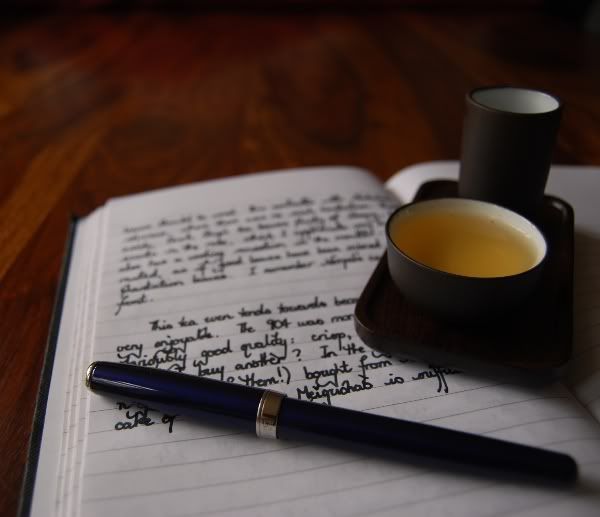
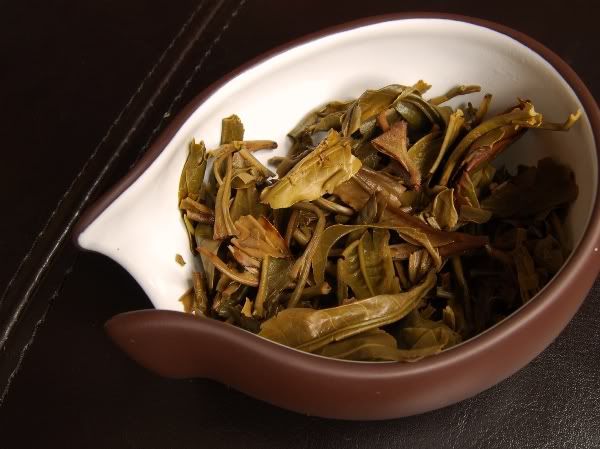
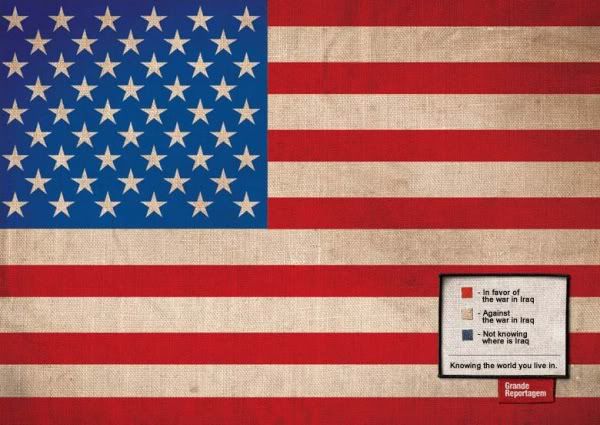
Several times I have been at the point of buying some of these '08 and '09 offerings of Jim's, so I really appreciate hearing your opinion as well as those of others. Thanks!
ReplyDeleteDear Salsero,
ReplyDeleteAny time, good sir! I seem to remember reading that you liked the 802, and that's one I haven't tried yet - I'll hunt out a sample!
Toodlepip,
Hobbes
Hello, Hobbes;
ReplyDeleteIt's strange we went to different direction on this tea. I did not like the start of it, but enjoyed the finishing part.
Indeed, it's hard to tell if the maocha is from a big tree or not, and if there is some monkey business involved by mixing some qiaomu and some plantation tea leaves to make it cheap.
I did walk the walk to the tea field, saw the tea field myself and even shot a video that posted at YouTube. Nevertheless, I did not feel to be cheated since the material was reasonably cheap for the taste offered.
I liked the saying by a tea critic, 'the best tea is the tea you like the most.'
Cheers!
Jim
Dear Jim,
ReplyDeleteI'm impressed that you saw the tea field - I'll have to go and dig out the YouTube video!
I wouldn't feel at all cheated - it's decent maocha, and the final price to the customer is very reasonable.
My favourite is the 901 - more on that later. :)
Toodlepip,
Hobbes
Great post I stumbled it
ReplyDelete